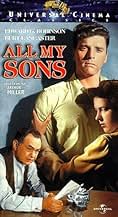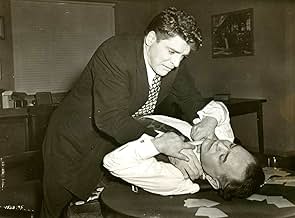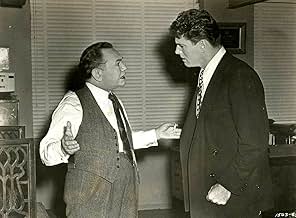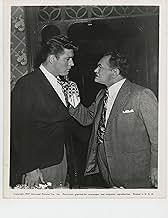Füge eine Handlung in deiner Sprache hinzuDuring WW2, industrialist Joe Keller commits a crime and frames his business partner Herbert Deever but years later his sin comes back to haunt him when Joe's son plans to marry Deever's dau... Alles lesenDuring WW2, industrialist Joe Keller commits a crime and frames his business partner Herbert Deever but years later his sin comes back to haunt him when Joe's son plans to marry Deever's daughter.During WW2, industrialist Joe Keller commits a crime and frames his business partner Herbert Deever but years later his sin comes back to haunt him when Joe's son plans to marry Deever's daughter.
- Regie
- Drehbuch
- Hauptbesetzung
- Auszeichnungen
- 2 Gewinne & 2 Nominierungen insgesamt
- Frank Lubey
- (as Henry Morgan)
- Townswoman
- (Nicht genannt)
- Jorgenson
- (Nicht genannt)
- Mrs. Hamilton
- (Nicht genannt)
- Bartender
- (Nicht genannt)
- Workman
- (Nicht genannt)
- Judge
- (Nicht genannt)
- Halliday
- (Nicht genannt)
- McGraw
- (Nicht genannt)
Empfohlene Bewertungen
They were both guilty....
It's a wonderful story and very well performed and written, but that fact remains to be discussed.
Here the opening scenes are middle class and almost mundane and so post war. A son (Burt Lancaster) has returned from war and is planning to marry the girl of his dead brother, killed in the war. The living son's mother can't deal with the fact that her dead son is indeed dead - he died on an aerial mission and his body was never recovered. And thus she is not very supportive of this prospective union.
But this film turns out not to be about war and remembrance and the new middle class at all. Instead it is about a deed past done, and apparently the perpetrator has gotten away with it, and only as the film wears on are all of the secrets revealed, as well as the real reason the mother cannot accept her son's death.
Edward G. Robinson is terrific as the father who is living the American dream after being set out on the sidewalks by his own family since the age of ten. Lancaster with his beaming smile and his head full of bushy hair would look at home in a collegiate letter jacket, and this is a good early showcase for his talents. Harry Morgan appears in a minor role as one of the fathers of the ongoing baby boom.
I haven't said much here about what is really the conflict in this film, because I don't want to give anything away. However, it is a great film about moral conflict versus friend and family and even patriotic obligations, and it is a shame it is so obscure.
The production style and direction (for reasons of cost and utility) let the words of Miller's play take center stage. In beautiful black-and-white, the Art and Set direction are spare, firm, and commanding. They command our attention. Miller is big on attention to the issues his characters are grappling with and their impact on the significant issues of our (and all) time.
As Miller repeats in Death of a Salesman, there are layers of meaning and understanding between his characters and the issues they confront internally and externally. The two business partners have had a long, intimate family relationship (like Cain and Able). So close a connection that his son could have married his partner's daughter. And she, of course, is the only one who has always known (from that son) the truth about the son's death. And the fact (s) about the father.
Miller shows us that the father's Horatio Alger lies are at the foundation of who we are individually and collectively as Americans; the lies can almost thoroughly wash out what individuals and a community should think about its leading citizens. It is an interesting plot twist that, as Miller's script points out, the low-class birth and poverty of the father embed him into the fabric of the community.
That the film faithfully carried Miller's message of contempt and loathing not only for the worship of that false god(capitalism) but also for the whole Horatio Alger hero myth (that both American liberals and conservatives embrace) is quite daring. Even for a film world that had not yet descended into the long night of the "Black List."
Wusstest du schon
- WissenswertesThe original Broadway production of "All My Sons" opened at the Coronet Theater in New York on January 29, 1947. It ran for 328 performances, and won the 1947 Best Play Tony Award for author Arthur Miller. His original script was used as the basis for this movie's screenplay.
- PatzerWhen Joe comes out of the house upon Annie's arrival, he comes down the front steps and walks into the yard with his arms raised. In the next instant, he's back at the steps and his arms are down.
- Zitate
Jim Bayliss: Put her to bed, Joe. Both of you go to bed. Staying up won't help; sleep will. Sleep's a wonderful thing, the best thing about living.
- VerbindungenFeatured in Film Preview: Folge #1.1 (1966)
Top-Auswahl
- How long is All My Sons?Powered by Alexa
Details
- Erscheinungsdatum
- Herkunftsland
- Offizielle Standorte
- Sprache
- Auch bekannt als
- All My Sons
- Drehorte
- Santa Rosa, Kalifornien, USA(the Grace home on McDonald Avenue)
- Produktionsfirma
- Weitere beteiligte Unternehmen bei IMDbPro anzeigen
- Laufzeit1 Stunde 34 Minuten
- Farbe
- Seitenverhältnis
- 1.37 : 1
Zu dieser Seite beitragen























